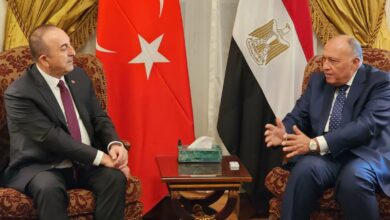Tripoli — Forces loyal to Muammar Qadhafi shelled the besieged western town of Misrata on Sunday where doctors say hundreds have been killed despite two weeks of Western airstrikes meant to put a stop to civilian deaths.
The popular uprising has turned into a civil war pitting Qadhafi's troops, tanks and artillery against an enthusiastic, but chaotic rebel force backed by Western air power. Neither side has for now been able to gain the upper hand.
The rebels are, however, attempting to put their house in order, naming a "crisis team" with the former interior minister as the armed forces chief of staff, to try to run parts of Libya it holds and reorganizing their military force.
But that offers respite for Misrata which, like many cities, rose up against Qadhafi's rule in mid-February. It is now surrounded by government troops after a violent crackdown put an end to protests elsewhere in the west of the country.
The shelling of Misrata on Sunday hit a building that had been used to treat wounded in Libya's third largest city and killed at least one person and wounded more, a resident said.
A doctor who gave his name as Ramadan told Reuters by telephone from the city that 160 people, mostly civilians, had been killed in fighting in Misrata over the past seven days.
Ramadan, a British-based doctor who said he arrived in Misrata three days ago on a humanitarian mission, had no figure for the total toll since fighting began six weeks ago.
"But every week between 100 or 140 people are reported killed — multiply this by six and our estimates are 600 to 1000 deaths since the fighting started," he said.
REBELS REORGANISING
After weeks of shelling and encirclement, Qadhafi's forces appear to be gradually loosening the rebels' hold on Misrata. Rebels say they still control the city center and the port, but government troops have pushed into the center.
One Benghazi-based rebel said food supplies were acutely low in Misrata. "There are severe food shortages and we call on humanitarian organizations to help," said the rebel called Sami, who said he was in regular contact with a Misrata resident.
Accounts from Misrata cannot be independently verified because Libyan authorities are not allowing journalists to report freely from the city, 200km (130 miles) east of Tripoli.
As well as laying siege to Misrata, Qadhafi's troops have reversed a rebel advance in the east and are mopping up resistance in the mountainous southwest of Tripoli.
Government forces shelled the small town of Yafran, southwest of the capital on Sunday, killing two people, Arabiya television reported, quoting a witness.
But in the east the rebels said they had restructured their forces to end the pendulum swing of their euphoric advance in the wake of Western air strikes followed by chaotic headlong retreat in the face of government artillery.
"We are reorganizing our ranks. We have formed our first brigade. It is entirely formed from ex-military defectors and people who've come back from retirement," Former Air Force Major Jalid al-Libie told Reuters in Benghazi.
Asked about numbers, he said he could not reveal that, but added, "it's quality that matters."
The aim was for the trained force to steel resistance of the many volunteers so the rebel army could hold ground.
"Before the end of the week you will see a different kind of fighting and that will tip the balance," said Libie, a former fighter pilot.
The rebel leadership called for NATO-led air assault to continue despite 13 rebel fighters being killed in a strike as they tried to take control of the eastern oil town of Brega.
A Reuters correspondent visiting the scene of Friday's air strike saw at least four burned-out vehicles, including an ambulance, by the road near the eastern entrance to Brega.
Men prayed at freshly dug graves covered by the rebel red, black and green flag nearby.
Most blamed a Tripoli agent for drawing the "friendly fire."
But some gave a different account. "The rebels shot up in the air and the alliance came and bombed them. We are the ones who made the mistake," said a fighter who did not give his name.
A rebel spokesman, Mustafa Gheriani, told Reuters the leadership still wanted and needed allied air strikes. "You have to look at the big picture. Mistakes will happen. We are trying to get rid of Qadhafi and there will be casualties, although of course it does not make us happy."
CRISIS TEAM
Hundreds of mostly young, inexperienced volunteers were seen fleeing east from Brega toward the town of Ajdabiyah after coming under heavy mortar and machinegun fire.
A contingent of more experienced and better organized rebel units initially held their ground in Brega, but with most journalists forced east, it was unclear whether they had remained inside the town or had pulled back into the desert.
NATO has conducted 363 sorties since taking over command of the Libya operations on 31 March, and about 150 were intended as strike missions, but NATO has not confirmed hitting any targets.
In Benghazi, the rebel council named its "crisis team" on Saturday to administer parts of the country it controls.
Omar Hariri is in charge of the military department, with General Abdel Fattah Younes al Abidi, a long serving officer in Qadhafi's armed forces, as his chief of staff.
Younes, a former Libyan interior minister, changed sides at the start of the uprising in mid-February but is distrusted by many in the rebel camp because of his past ties to Qadhafi.




